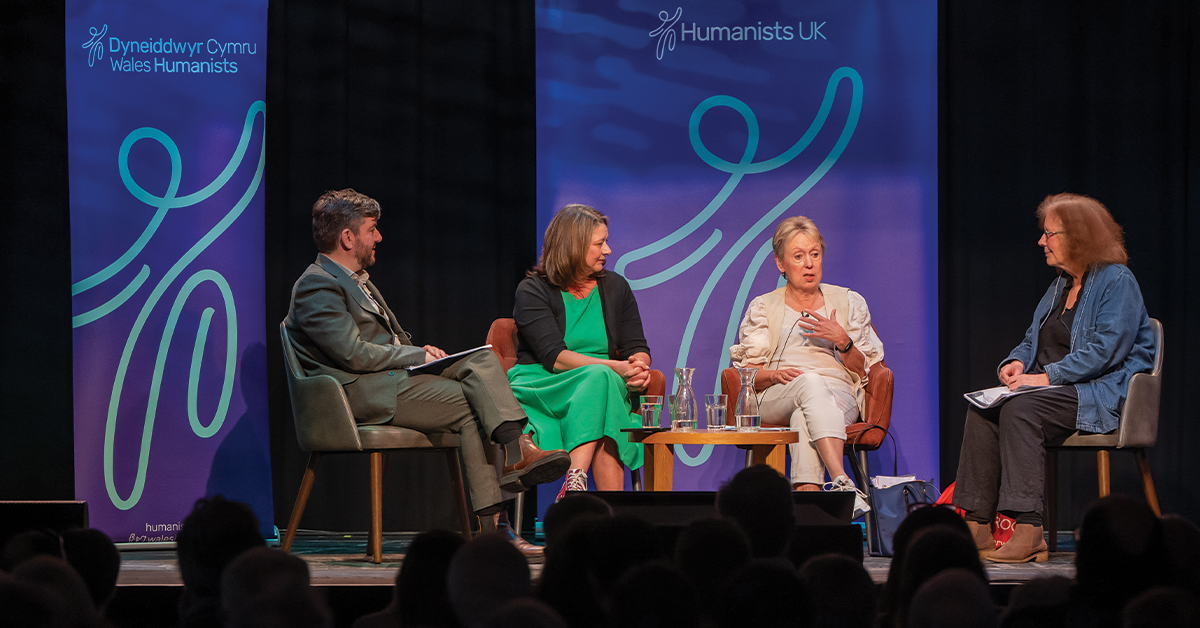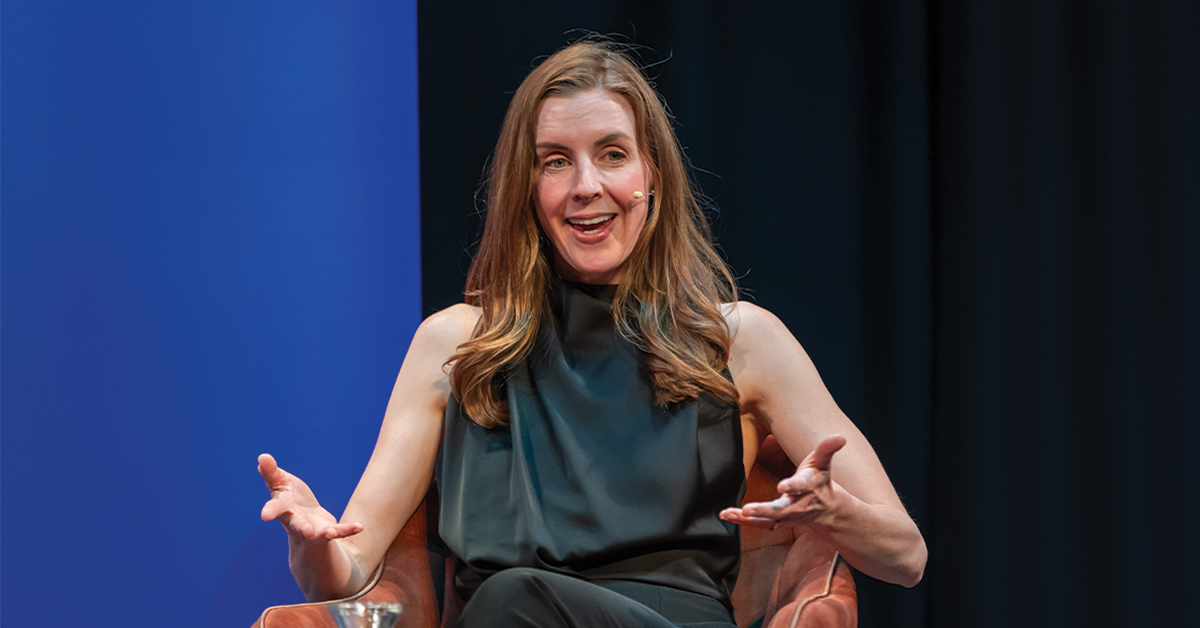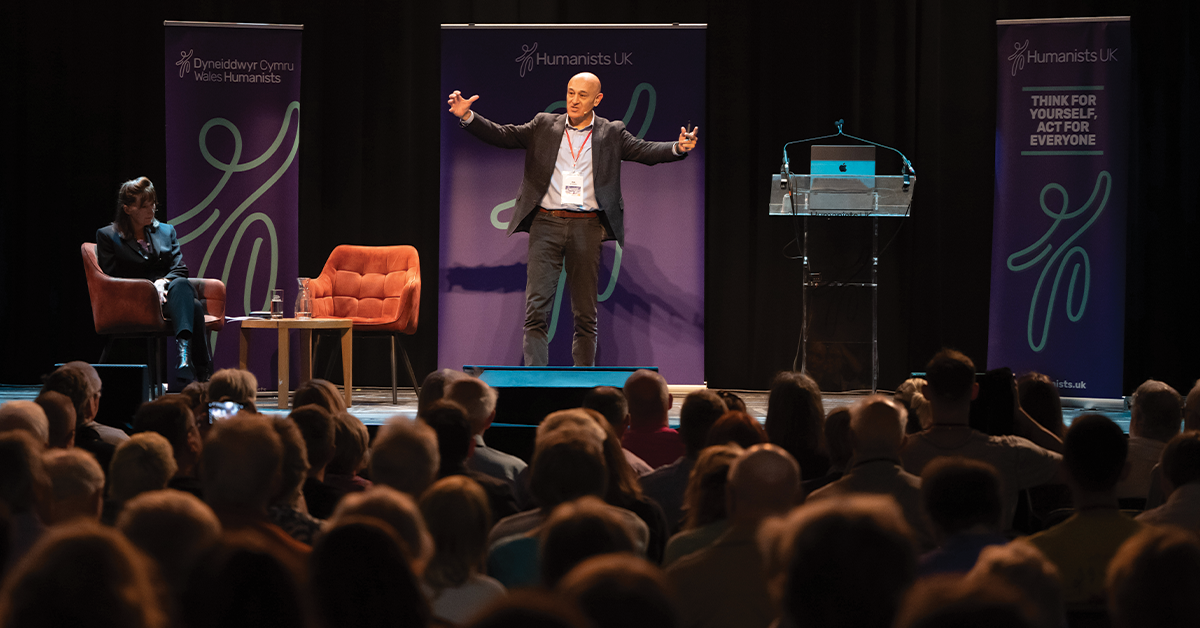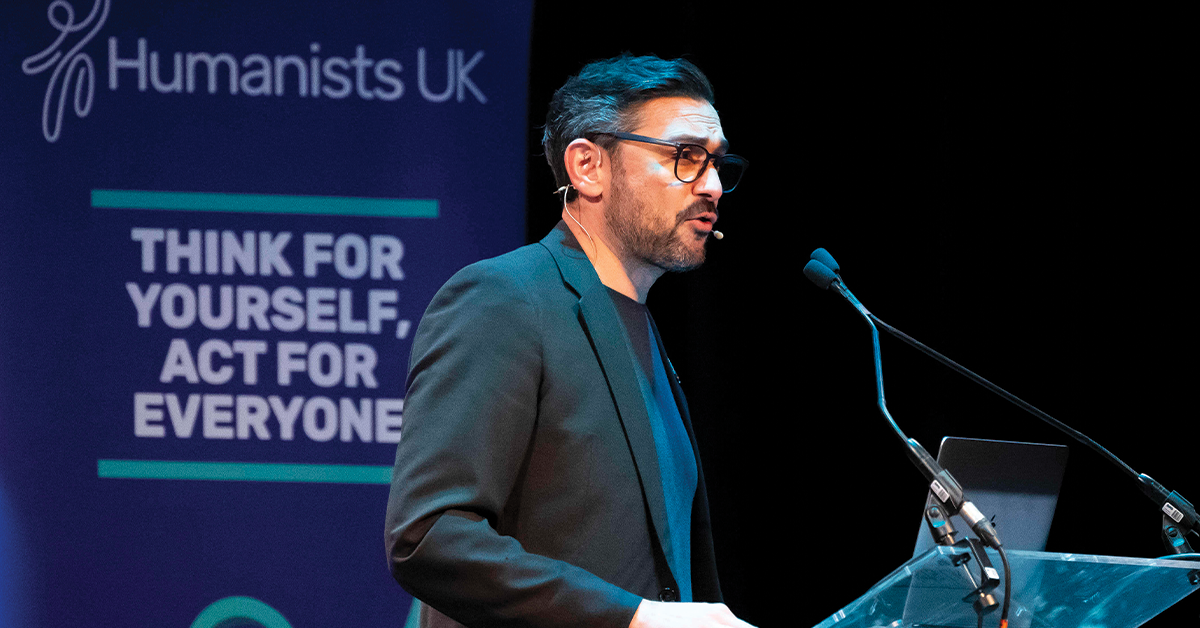






Over the weekend, Cardiff became a vibrant hub of humanist ideas as roughly 600 people from all corners of Wales gathered for Humanists UK’s largest Convention in seven years – Humanists UK 2024.
The event was an opportunity for like-minded individuals to connect, engage in thought-provoking discussions, and explore the many ways in which humanists are actively working towards a better society and supporting non-religious people to lead happier, more ethical lives.
Friday evening commenced with the intriguing ‘The Ego Trick’, an exploration of philosophy and illusion led by Humanists UK patron and philosopher Julian Baggini [pictured bottom right] and the talented illusionist Callum Weaver [pictured middle right]. As the night progressed, laughter filled the air as a trio of rising comedy stars took to the stage. New humanist favourites Dani Johns [top right], Tadiwa Mahlunge [pictured top left], and Jacob Hawley [pictured bottom left] entertained the crowd with their unique blend of humour and social commentary.





Saturday morning kicked off with the return of philosopher Julian Baggini, who explored the diverse global landscape of humanism. Delving into definitions and explanations of naturalistic, humanist philosophies from around the world, he examined Confucian ethics, African Ubuntu philosophy, Western Enlightenment philosophy, and 20th century descriptions of scientific humanism, illuminating how startling similar humanist approaches to life originated independently in different cultural contexts on different sides of the planet over thousands of years, including in cultures where traditional theistic religions never took hold.
Following this, Humanist Heritage Coordinator Madeleine Goodall presented an insightful exploration of the humanist tradition in Wales, highlighting stories such as the inspiring life of Josiah Hughes, a freethinker in a conservative society, as well as the self-described humanist and NHS pioneer Nye Bevan. She and her audience reflected on how 100 years of disestablishment contributed to widespread humanist ‘common sense’ of today’s largely non-religious Wales, and the inclusive, civic, secular culture of Welsh politics.

Humanists UK’s guest of honour was Mark Drakeford, former First Minister of Wales, who delivered a compelling keynote lecture on the pluralist, secular, and inclusive political values and ideals that have underpinned devolution and shaped public life in Wales. Drakeford was invited by Humanists UK to reflect on humanism in Wales and his time in office. He advocated for cross-party collaboration and democratic decision-making, arguing that collective action increases overall community freedom.
In response to a question, he expressed his support for a compassionate assisted dying law, noting it would likely pass in the Senedd if devolved and emphasising the need for consistent rights across the UK. Drakeford’s non-party-political speech, rich with references to Wales’ unique culture and the principles guiding its politics, culminated in a standing ovation by an audience of 600 humanists.

Saturday continued with our expert political panel discussion featuring prominent political figures, focusing on the integration of humanist values into politics. The event showcased a great humanist political discussion with Lib Dem peer Baroness Lorely Burt, Labour Member of the Senedd Julie Morgan, and former leader of Plaid Cymru Leanne Wood.
The panel highlighted Wales’ consistent efforts in paving the way for progress. Notable achievements discussed included promoting humanism in education, leading the ban on smacking children, and becoming an early adopter of the opt-out organ donation system.

Delegates were captivated by a powerful panel discussion featuring immigration lawyer Jamie Bell, successful humanist asylum claimant Aseel M, and asylum researcher Lucy Potter. Jamie outlined the political landscape that has determined the UK’s immigration system, while Lucy shared her ground-breaking research, exposing the significant challenges faced by non-religious asylum seekers. Aseel delivered a deeply personal testimony of leaving religion, fleeing her home country, and navigating the UK’s asylum system as a non-religious claimant. She spoke candidly about the trauma, isolation, and pain of severing familial and community ties: ‘Knowing you can never return home, see your family, see your friends, ever again… It’s agonising.’
Afterwards, delegates divided in two for parallel sessions. Those who headed upstairs heard from Clare Elcombe Webber, Director of Humanist Care; Donna Craine, service manager for Humanists UK’s Faith to Faithless specialist support service for so-called ‘apostates’, and Yvonne Quaintrell, an experienced counsellor who offers therapy to apostates through Faith to Faithless. (Later that evening, diners at the annual fundraising dinner raised an incredible £17,000 towards funding Humanists UK’s asylum work and specialist helpline.)

At the same time over in the main hall, it was a pleasure to be joined by humanist favourite and classicist Catherine Nixey, whose talk challenged traditional understandings of early Christianity. She illuminated the diverse, absurd, and often conflicting portrayals of Jesus and other New Testament figures that existed during this period. By delving into these forgotten stories, Catherine explored the crucial role of power, politics, and chance in shaping religious history.
Brian Klaas, Associate Professor of Global Politics at University College London, closed the day with a captivating exploration of chaos theory and its profound impact on democracy. He challenged the audience to embrace uncertainty and reject nihilism, emphasising how our actions matter amidst the unpredictable nature of the world. Klaas’s message was clear: by embracing chaos, we can find purpose and meaning in our lives, even when we can’t control the outcome.

The sun shone down on our Cardiff on Sunday morning as we took a journey through space and time with theoretical physicist and our Vice President Jim Al-Khalili. While hundreds of delegates enjoyed their morning coffee, Jim urged everyone to consider the cosmic implications of our existence and to imagine hurtling through the galaxy at near-light speed. Time, he explained, becomes flexible at such velocities, slowing down for the traveller while years pass on Earth. To cross the galaxy at such speed would take one day in our time, but returning home, we’d find ourselves hundreds of thousands of years in the future. Jim reminded us that this isn’t science fiction, but a consequence of Einstein’s theory of relativity.
Humanists are successfully impacting laws, promoting autonomy, compassion, and freedom, said Humanists UK’s Assisted Dying Campaigner Nathan Stilwell and Education Campaigns Manager Lewis Young – from the vote to legalise assisted dying in Jersey to removal of creationism in schools. But there is still work to be done: including stopping the massive expansion of faith school discrimination and bringing about compassionate assisted dying laws in the UK.

Julia Shaw then took the stage, delivering an empowering talk on the history and science of bisexuality. Her presentation skilfully dismantled harmful misconceptions surrounding bisexuality, particularly those rooted in prejudiced attitudes and flawed studies from the 1890s to 1970s that dismissed it as a passing trend. As these attitudes unfortunately still linger today, Shaw’s spotlight on the decades of unjustly ignored academic research on bisexuality was both timely and crucial.

Bringing things to a close was Humanists UK President Adam Rutherford who headlined the Sunday sessions with a characteristically irreverent-yet-brilliant lecture on DNA Vs Hip Hop. Drawing a compelling parallel between life on Earth, DNA, and music, Rutherford illuminated how all three rely on replication, merging characteristics, and evolution from common ancestors. Whether mixing beats or genetic code, he argued, both possess phenomenal creative powers, giving birth to new species or genres over time.
The audience, grooving to the infectious rhythm of the Amen Break and its musical evolution, viscerally experienced this fascinating connection. Rutherford then pivoted to a more sobering topic: the commercial ownership of genetic codes in the biotech industry. He challenged the audience to question the ethics of patenting naturally occurring life, asserting that this, like music, is merely replication.
In true Humanists UK fashion, Adam urged critical thinking and collective action, asking who should rightfully own this potentially life-altering information, especially when it holds the power to cure diseases, create fuels, and feed humanity. Closing the Convention ahead of Humanists UK’s AGM later that day, it was announced that Humanists UK 2025 will take place in Sheffield.
Notes
For further comment or information, media should contact Humanists UK Director of Public Affairs and Policy Richy Thompson at press@humanists.uk or phone 0203 675 0959.
The Convention was professionally recorded highlights will appear on the Humanists UK YouTube channel in the coming weeks.
Humanists UK is the national charity working on behalf of non-religious people. Powered by over 120,000 members and supporters, we advance free thinking and promote humanism to create a tolerant society where rational thinking and kindness prevail. We provide ceremonies, pastoral care, education, and support services benefitting over a million people every year and our campaigns advance humanist thinking on ethical issues, human rights, and equal treatment for all.
Photography credit: Matthew Horwood: archive.matt-horwood.com
